牛津译林版初中英语七年级上册Unit 5 Let’s celebrate单元复习课件(共27张PPT)
文档属性
| 名称 | 牛津译林版初中英语七年级上册Unit 5 Let’s celebrate单元复习课件(共27张PPT) |
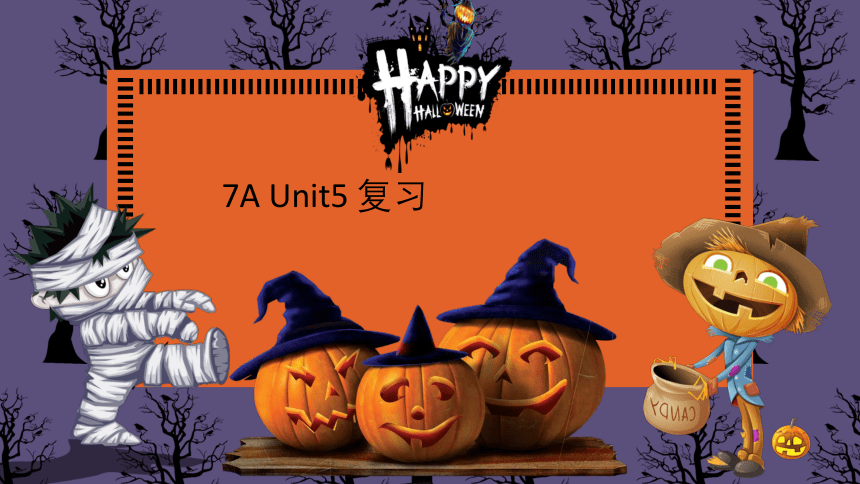
|
|
| 格式 | zip | ||
| 文件大小 | 4.5MB | ||
| 资源类型 | 教案 | ||
| 版本资源 | 牛津译林版 | ||
| 科目 | 英语 | ||
| 更新时间 | 2021-11-24 00:00:00 | ||
图片预览

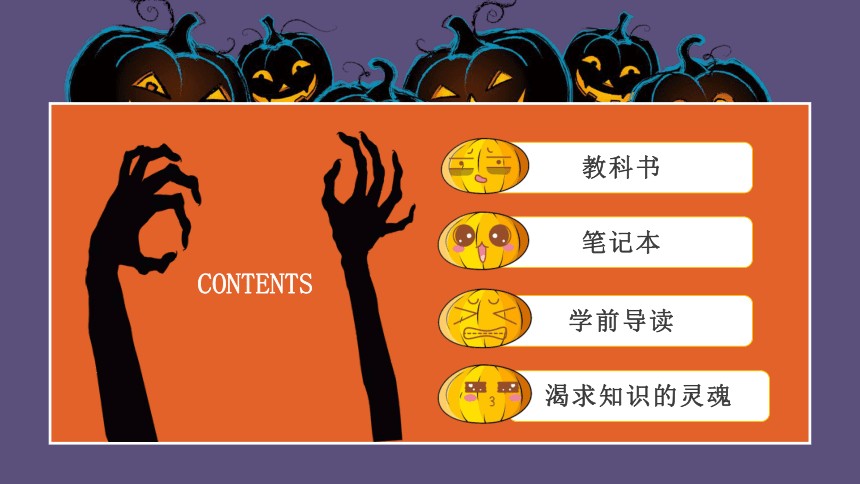
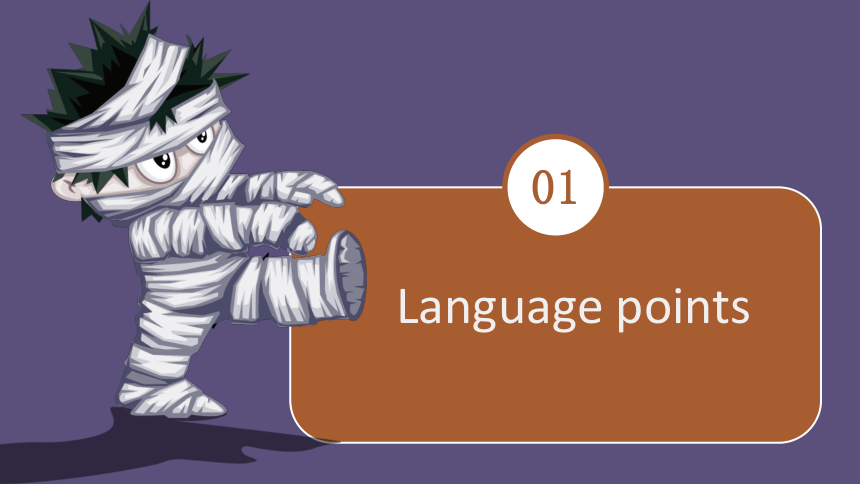
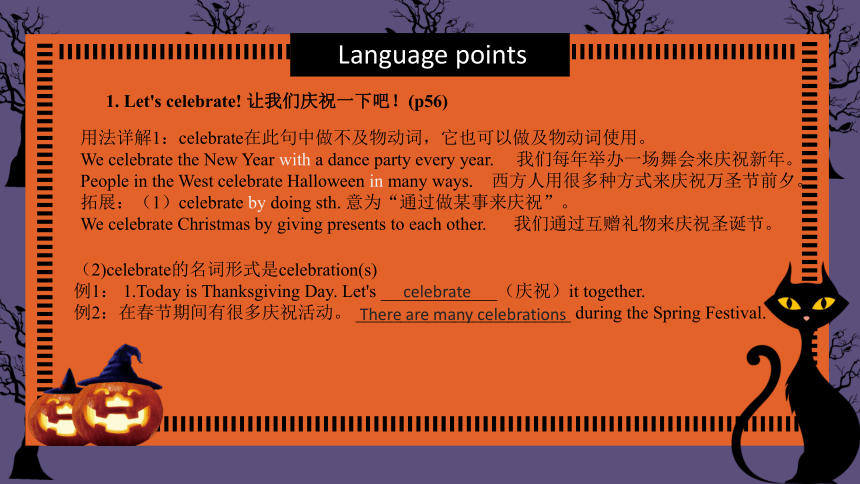
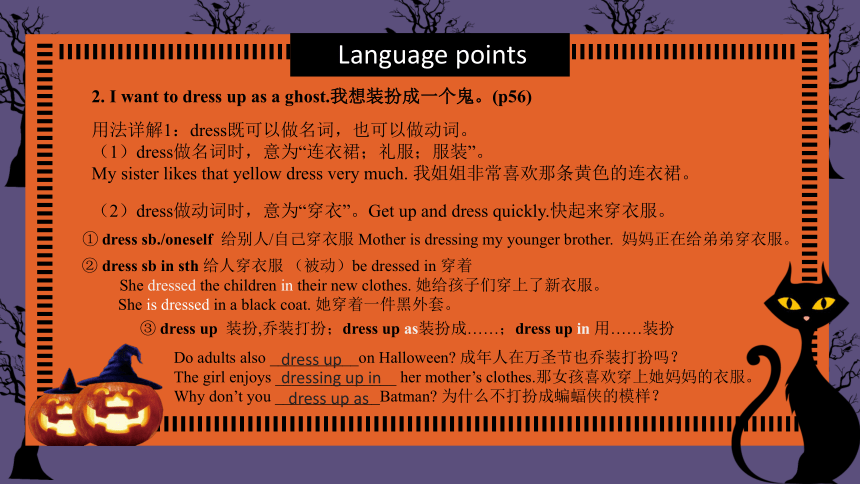
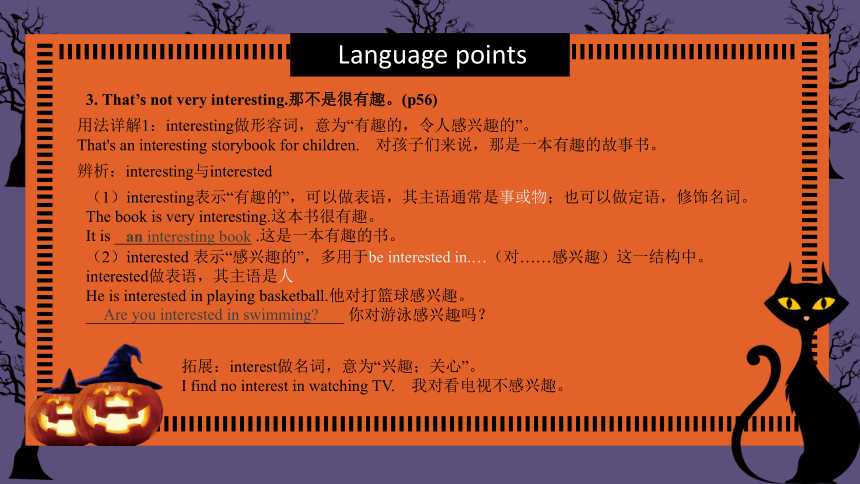
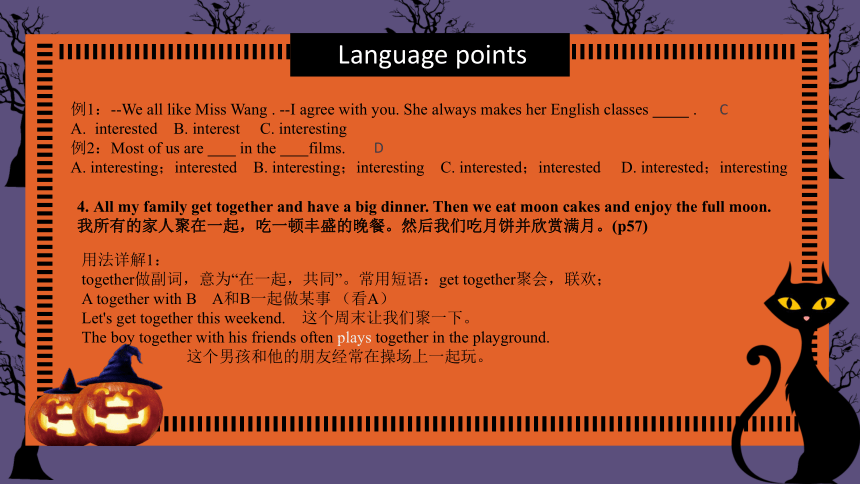
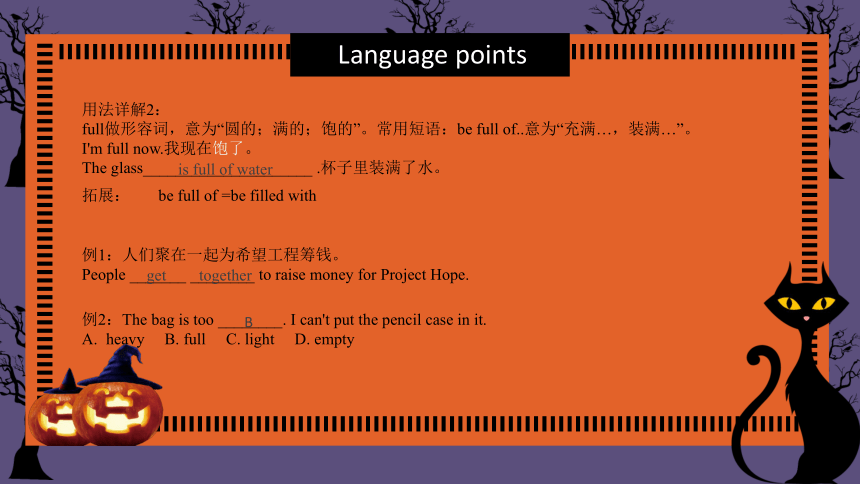
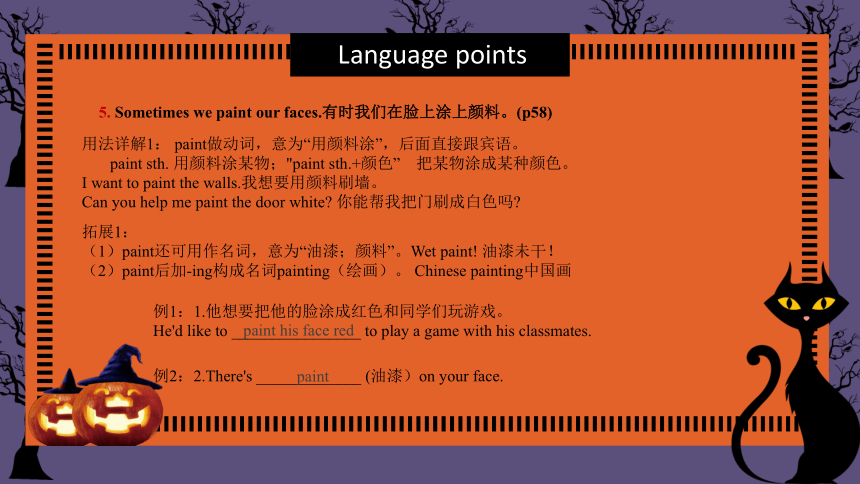
文档简介
(共27张PPT)
7A Unit5 复习
教科书
笔记本
学前导读
渴求知识的灵魂
CONTENTS
01
Language points
Language points
1. Let's celebrate! 让我们庆祝一下吧!(p56)
用法详解1:celebrate在此句中做不及物动词,它也可以做及物动词使用。
We celebrate the New Year with a dance party every year. 我们每年举办一场舞会来庆祝新年。
People in the West celebrate Halloween in many ways. 西方人用很多种方式来庆祝万圣节前夕。
拓展:(1)celebrate by doing sth. 意为“通过做某事来庆祝”。
We celebrate Christmas by giving presents to each other. 我们通过互赠礼物来庆祝圣诞节。
(2)celebrate的名词形式是celebration(s)
例1: 1.Today is Thanksgiving Day. Let's _____________(庆祝)it together.
例2:在春节期间有很多庆祝活动。 ________________________ during the Spring Festival.
celebrate
There are many celebrations
Language points
2. I want to dress up as a ghost.我想装扮成一个鬼。(p56)
用法详解1:dress既可以做名词,也可以做动词。
(1)dress做名词时,意为“连衣裙;礼服;服装”。
My sister likes that yellow dress very much. 我姐姐非常喜欢那条黄色的连衣裙。
(2)dress做动词时,意为“穿衣”。Get up and dress quickly.快起来穿衣服。
① dress sb./oneself 给别人/自己穿衣服 Mother is dressing my younger brother. 妈妈正在给弟弟穿衣服。
② dress sb in sth 给人穿衣服 (被动)be dressed in 穿着
She dressed the children in their new clothes. 她给孩子们穿上了新衣服。
She is dressed in a black coat. 她穿着一件黑外套。
③ dress up 装扮,乔装打扮;dress up as装扮成……;dress up in 用……装扮
Do adults also ___________on Halloween 成年人在万圣节也乔装打扮吗?
The girl enjoys _______________ her mother’s clothes.那女孩喜欢穿上她妈妈的衣服。
Why don’t you _____________Batman 为什么不打扮成蝙蝠侠的模样?
dress up
dressing up in
dress up as
Language points
3. That’s not very interesting.那不是很有趣。(p56)
用法详解1:interesting做形容词,意为“有趣的,令人感兴趣的”。
That's an interesting storybook for children. 对孩子们来说,那是一本有趣的故事书。
拓展:interest做名词,意为“兴趣;关心”。
I find no interest in watching TV. 我对看电视不感兴趣。
辨析:interesting与interested
(1)interesting表示“有趣的”,可以做表语,其主语通常是事或物;也可以做定语,修饰名词。
The book is very interesting.这本书很有趣。
It is _________________ .这是一本有趣的书。
an interesting book
Are you interested in swimming
(2)interested 表示“感兴趣的”,多用于be interested in.…(对……感兴趣)这一结构中。
interested做表语,其主语是人
He is interested in playing basketball.他对打篮球感兴趣。
________________________________ 你对游泳感兴趣吗?
Language points
例1:--We all like Miss Wang . --I agree with you. She always makes her English classes .
interested B. interest C. interesting
例2:Most of us are in the films.
A. interesting;interested B. interesting;interesting C. interested;interested D. interested;interesting
C
D
4. All my family get together and have a big dinner. Then we eat moon cakes and enjoy the full moon.
我所有的家人聚在一起,吃一顿丰盛的晚餐。然后我们吃月饼并欣赏满月。(p57)
用法详解1:
together做副词,意为“在一起,共同”。常用短语:get together聚会,联欢;
A together with B A和B一起做某事 (看A)
Let's get together this weekend. 这个周末让我们聚一下。
The boy together with his friends often plays together in the playground.
这个男孩和他的朋友经常在操场上一起玩。
Language points
用法详解2:
full做形容词,意为“圆的;满的;饱的”。常用短语:be full of..意为“充满…,装满…”。
I'm full now.我现在饱了。
The glass_____________________ .杯子里装满了水。
is full of water
例1:人们聚在一起为希望工程筹钱。
People _______ ________ to raise money for Project Hope.
例2:The bag is too ________. I can't put the pencil case in it.
heavy B. full C. light D. empty
get
together
B
拓展: be full of =be filled with
Language points
5. Sometimes we paint our faces.有时我们在脸上涂上颜料。(p58)
用法详解1: paint做动词,意为“用颜料涂”,后面直接跟宾语。
paint sth. 用颜料涂某物;"paint sth.+颜色” 把某物涂成某种颜色。
I want to paint the walls.我想要用颜料刷墙。
Can you help me paint the door white 你能帮我把门刷成白色吗
拓展1:
(1)paint还可用作名词,意为“油漆;颜料”。Wet paint! 油漆未干!
(2)paint后加-ing构成名词painting(绘画)。 Chinese painting中国画
例1:1.他想要把他的脸涂成红色和同学们玩游戏。
He'd like to ________________ to play a game with his classmates.
例2:2.There's _____________ (油漆)on your face.
paint his face red
paint
Language points
6. Thank you for telling me about the Mid-Autumn Festival. 感谢你告诉我有关中秋节的事。(p58)
用法详解1:
Thank sb. for sth./doing sth. 因……感谢某人
Thank you for your coming. 感谢你的到来。
Thank you for helping me with my homework. 感谢你在回家作业上帮助我。
用法详解2:tell sb. about sth. 意思是“告诉某人关于某事”。(围绕这件事情有描述)如:
Could you tell me something about your school 你能告诉我有关你们学校的事吗
tell sb. sth. =tell sth. to sb. 告诉某人某事(直接事物)
Don’t tell anybody my name.别把我的名字告诉任何人。
拓展:拓展与tell相关的短语:
tell sb.(not) to do sth. 让某人(不要)做某事
tell the truth 说实话
tell a story 讲故事 tell a lie 说谎
Language points
7. We knock on their doors and shout “trick or treat”.我们敲他们的门,嘴里喊着“不招待就使坏”。(p58)
用法详解1: (1)knock on意为“敲(门、窗、桌子等)”,也可以用knock at替换。如:
Please knock on/at the door before you come into the room. 在你进入这个房间之前请敲门。
Is anybody knocking at/on the window 有人在敲窗户吗?
用法详解2:shout 大喊;大叫
He shouted that he couldn't swim.他大叫他不会游泳。
He rushed out of the house, shouting for help.他冲出房子,大声呼救。
拓展:shout的常见短语:
shout at sb.对某人大喊大叫 shout out 突然大声说
例1:He often __________ my desk.
knock at B. knock on C. knocks at D. knocks in
例2:It's impolite to _________ at others.
C
shout
Language points
8. People make lanterns out of oranges.人们用橘子做成灯笼。(p58)
用法详解1:make...out of...意为“用……做成……”。如:
My father can make a kite out of paper. 我父亲会用纸做风筝。
例1:例同义句转换
We can use a pumpkin to make a lantern.
We can _______a lantern _______ _______a pumpkin.
make
out
of
拓展 (1)be made of… 由……制成 (原材料性质没有变化)
The desk is made of wood.这张桌子是由木头制成的 。
(2)be made from… 由……制成 (原材料性质变化)
Paper is made from wood.纸是由木头制成的。
(3) be made in… 产自…… (be) made in China 中国制造
(4) be made by hand 手工制造
(5) be made up of 由…组成
Our class is made up of 20 boys and 20 girls.
Language points
9.Children have lots of fun on that day. 那一天孩子们很快乐。(p58)
1) fun un. 乐趣,乐事
Playing basketball is fun. 打篮球是一件快乐的事。
Reading is fun. 阅读是一件快乐的事。
2) have fun doing. 做某事很开心=have a good time doing sth.
She has fun watching films with her friends. 和朋友一起看电影,她很开心。
3) It’s fun to do sth. 做某事是件乐事
It’s fun to play basketball. (改成感叹句)
What fun it is to play basketball! 打篮球是多么快乐的事啊!
Language points
10. If they do not give us a treat, we play a trick on them. 如果他们不招待我们,我们就捉弄他们。(p58)
用法详解1:
(1)if意为“如果”,此句中If引导的从句为条件状语从句,we play a trick on them为主句。如:
If you are ill, you must see a doctor. 如果你生病了,你必须看医生。
提醒: 主将从现 (注意标点符号)
If it rains tomorrow, we'll stay at home. 如果明天下雨,我们就待在家里。
She will go hiking if it is fine next Saturday. 如果下个星期六天气好,她就去远足。
用法详解2:give sb. sth. as a treat = give sb. a treat of sth. 用……招待某人
用法详解3: candy单指糖果时一般不可数.但是指各种糖果或者强调糖果种类繁多时可数。
Language points
11. When the evening comes, we visit houses and play a game with the people inside.当夜晚降临时,我们走家串户,和屋里的人玩游戏。(p58)
句式剖析:该句是一个复合句。其中when引导时间状语从句。
用法详解:when做连词,意为“当……时”,引导时间状语从句。在含有when引导的时间状语从句的主从复合句中,主句用一般将来时,从句用一般现在时表将来。(主将从现)
I will tell you when he comes tomorrow.他明天来的时候,我会告诉你。
拓展: when还可做疑问副词,意为“何时,什么时候”。
When do you get up in the morning 你早上什么时候起床
例1:--When will he come --When , I'll let you know.
A. does he come B. he comes C. will he come D. he will come
B
Language points
12. Because the Dragon Boat Festival is coming!因为端午节就要到了!(p62)
句式剖析: 该句是由because引导的原因状语从句。
用法详解1:because做连词,意为“因为”,后跟句子,引导原因状语从句。注意because不能与so连用。
I like my classroom because it is big and clean.我喜欢我的教室,因为它既大又干净。(注意标点)
拓展: because of意为“因为”,后接表示原因的词或短语。
He can't play football ______________________. 由于他的腿不好,他不能踢足球。
because of his poor leg
句式剖析:句中be + doing结构,用现在进行时表将来。
用法详解2:该句虽然用了现在进行时,但表示将来。英语中有些动词,如come, go, leave,move, fly, plan等地点转移词可用现在进行时表示将来。
I'm leaving for Shanghai tomorrow.明天我就要动身去上海了。
例1:--Supper is ready, Linlin. --I ____________(come).
am coming
Language points
13. Find out more on New York Radio.在纽约电台查找更多(信息)。(p63)
用法详解1: (1)find out意为“查明;弄清(情况)”。如:
I want to find out who broke the window.我想弄明白是谁打破了窗户。
They must find out some information about planes to Hong Kong as quickly as possible.
他们必须尽快查到有关去往香港的飞机的一些信息。
例1:The chair is broken. Please who broke it.
A. look for B. find C. find out D. look at
C
用法详解2: on New York Radio意为“通过纽约电台”,其中on是介词,表示“通过;使用;借助于(某种方式)”。如:I often chat with my mother on the phone.我经常跟我妈妈通过电话聊天。
拓展on还有多种用法,常见的意思有“在……之上”等。如:
Please put the clothes on the bed.请把衣服放到床上。
例2: Many people like watching the Spring Festival Gala ______TV.
A.in B. of C.at D. on
D
Language points
辨析: find, find out与look for
词条 意义及用法 例句
find 意为“找到”“发现”,强调“找”的结果,其宾语往往是某个丢失的东西或人 Did you find Li Ming yesterday
你昨天找到李明了吗
find out 着重表示通过理解、分析、思考、询问等“弄清楚”“查明”一件事情,其后的宾语常常是某个情况、事实 Please find out when the train leaves.
请查一下火车什么时候离站。
look for 意为“寻找”,是有目的地找,强调“寻找”这一动作 -What are you looking for —你在找什么
一I'm looking for my bike.
——我在找我的自行车。
例4: Where's my ruler I can't ______ it anywhere.
look for B. find out C. find D. look out
C
Language points
14. You seem very happy, Millie.米莉,你似乎很高兴。(p64)
句式剖析: 该句为“主语+seem(s)(+to be)+表语”结构。
用法详解1: seem做连系动词,意为“好像,似乎,看来”,其常见用法如下:
(1)主语+seem(s)(+to be)+表语;表语多为名词或形容词,以说明主语的特征或状态。
Tom seems(to be)a very clever boy.汤姆似乎是一个非常聪明的男孩。
(2)主语+seem(s)+to do sth. Mrs. Green seems to like the idea.格林夫人似乎喜欢这个主意。
(3)It seems + that从句 It seems that Mr. Brown will not come again.布朗先生似乎不会再来了。
= __________________________
Mr. Brown doesn’t seem to come again.
例1:他好像很悲伤。___________________________________
He seems to be very sad. = It seems that he is very sad.
Language points
15. It is often cold at this time of year, but people are happy.每年的这个时候天气经常很冷,但人们是快乐的。(p67)
用法详解1: 句子中的it指“天气”。如:It's very cold in winter in Harbin.哈尔滨的冬天很冷。
拓展: it的一些用法归纳:
指代物。it可替代动植物与无生命的东西。
指代人。it可指代一个未亲眼看到的、不明身份性别的、面目不详的人或婴儿、儿童、照片中的人物等。也可指代上文提到的内容,或者是文中的内容。
如:--Who is crying in the room --It's my brother Jack. 我弟弟杰克。
--Thank you for your help. --Don't mention it. 别客气。
指时间。如:--What time is it by your watch --It's ten minutes past two.
指距离、速度、金钱、度量。
如: It's about ten kilometers from my home to my school.从我家到学校大约10千米。
Language points
16. We like to let off fireworks at night.我们喜欢在夜晚燃放烟花。(p67)
拓展: 与off相关的短语:
take off脱下;起飞 turn off关闭(电源)
put off推迟 get off下(公共汽车、火车、飞机等)
用法详解1: (1)let off意为“使(炸弹等)爆炸”,相当于set off。
The boys like to let off fireworks.男孩们喜欢燃放烟花。
(2)off可做介词,也可做副词,意为“离开,脱离”。
I must be off now.我现在必须得走了。
Exercises
03
Exercises
1.You can find out more information____ New York Radio___ this Saturday morning.
A. on;/ B. on; on C. at; on D. at; in
2.There was a big fire in Tianjin _____ the morning of August 12th.
A. in B. at C. on D. /
3.The young woman always ______ sunglasses in the sun.
A. wears B. puts on C. dresses D. tries on
4.My grandfather does well in ______ lanterns ______ oranges.
A. making; with B. make; out of C. making ;out of D. make ; with
5.Everyone is ______ in that ______ story.
A. interested;interesting B. interested;interested
C. interesting;interesting D. interesting;interested
1.A 2. C 3. A 4. C 5. A
Exercises
6. Jim seems very now because he has an book in his hand.
A. sad; interested B. happy; interesting
C. be happy; interested D. be happy; interesting
7. Can you
A. give some milk for me B. give me any milk
C. give some milk to me D. give any milk to me
8. We students from Beijing Sunshine Secondary School. We our school.
A. are all; like all B. are all; all like
C. all are; like all D. all are; all like
9. Could you please when the train is leaving
A. find B. look for C. find out D. to find out
6.B 7. C 8. B 9. C
Exercises
10. --Happy Chinese New Year! -- ____!
A. Thank you B. Me too
C. The same to you D. You are welcome
11. Nick's family _____ a big one. Listen! The family _____ singing Christmas songs.
is; is B. are; are C.is ; are D. are ; is
12. Look! There's _____ sheep on the hill. How lovely!
A. a little B. some C. many D. much
13. He is _____ holiday in Beijing. He often goes to cities _____ a holiday.
A. in; on B. on; for C. in; for D. for; on
10.C 11. C 12. A 13. B
Exercises
1.他似乎什么都懂。
_____________________________________________________
2.孩子们用不同的方式来庆祝儿童节。
_____________________________________________________
3.墙上有幅世界地图。
_____________________________________________________
4.我父母正在海南岛度假。
_____________________________________________________
5.这是我第一次观看舞狮。
_____________________________________________________
6.我可以通过收音机听音乐。
_____________________________________________________
He seems to know everything.
Children celebrate Children’s Day in different ways.
There is a map of the world on the wall.
My parents are on holiday in Hainan Island.
It’s my first time to watch the lion dance.
I can listen to music on the radio.
THANK YOU!
7A Unit5 复习
教科书
笔记本
学前导读
渴求知识的灵魂
CONTENTS
01
Language points
Language points
1. Let's celebrate! 让我们庆祝一下吧!(p56)
用法详解1:celebrate在此句中做不及物动词,它也可以做及物动词使用。
We celebrate the New Year with a dance party every year. 我们每年举办一场舞会来庆祝新年。
People in the West celebrate Halloween in many ways. 西方人用很多种方式来庆祝万圣节前夕。
拓展:(1)celebrate by doing sth. 意为“通过做某事来庆祝”。
We celebrate Christmas by giving presents to each other. 我们通过互赠礼物来庆祝圣诞节。
(2)celebrate的名词形式是celebration(s)
例1: 1.Today is Thanksgiving Day. Let's _____________(庆祝)it together.
例2:在春节期间有很多庆祝活动。 ________________________ during the Spring Festival.
celebrate
There are many celebrations
Language points
2. I want to dress up as a ghost.我想装扮成一个鬼。(p56)
用法详解1:dress既可以做名词,也可以做动词。
(1)dress做名词时,意为“连衣裙;礼服;服装”。
My sister likes that yellow dress very much. 我姐姐非常喜欢那条黄色的连衣裙。
(2)dress做动词时,意为“穿衣”。Get up and dress quickly.快起来穿衣服。
① dress sb./oneself 给别人/自己穿衣服 Mother is dressing my younger brother. 妈妈正在给弟弟穿衣服。
② dress sb in sth 给人穿衣服 (被动)be dressed in 穿着
She dressed the children in their new clothes. 她给孩子们穿上了新衣服。
She is dressed in a black coat. 她穿着一件黑外套。
③ dress up 装扮,乔装打扮;dress up as装扮成……;dress up in 用……装扮
Do adults also ___________on Halloween 成年人在万圣节也乔装打扮吗?
The girl enjoys _______________ her mother’s clothes.那女孩喜欢穿上她妈妈的衣服。
Why don’t you _____________Batman 为什么不打扮成蝙蝠侠的模样?
dress up
dressing up in
dress up as
Language points
3. That’s not very interesting.那不是很有趣。(p56)
用法详解1:interesting做形容词,意为“有趣的,令人感兴趣的”。
That's an interesting storybook for children. 对孩子们来说,那是一本有趣的故事书。
拓展:interest做名词,意为“兴趣;关心”。
I find no interest in watching TV. 我对看电视不感兴趣。
辨析:interesting与interested
(1)interesting表示“有趣的”,可以做表语,其主语通常是事或物;也可以做定语,修饰名词。
The book is very interesting.这本书很有趣。
It is _________________ .这是一本有趣的书。
an interesting book
Are you interested in swimming
(2)interested 表示“感兴趣的”,多用于be interested in.…(对……感兴趣)这一结构中。
interested做表语,其主语是人
He is interested in playing basketball.他对打篮球感兴趣。
________________________________ 你对游泳感兴趣吗?
Language points
例1:--We all like Miss Wang . --I agree with you. She always makes her English classes .
interested B. interest C. interesting
例2:Most of us are in the films.
A. interesting;interested B. interesting;interesting C. interested;interested D. interested;interesting
C
D
4. All my family get together and have a big dinner. Then we eat moon cakes and enjoy the full moon.
我所有的家人聚在一起,吃一顿丰盛的晚餐。然后我们吃月饼并欣赏满月。(p57)
用法详解1:
together做副词,意为“在一起,共同”。常用短语:get together聚会,联欢;
A together with B A和B一起做某事 (看A)
Let's get together this weekend. 这个周末让我们聚一下。
The boy together with his friends often plays together in the playground.
这个男孩和他的朋友经常在操场上一起玩。
Language points
用法详解2:
full做形容词,意为“圆的;满的;饱的”。常用短语:be full of..意为“充满…,装满…”。
I'm full now.我现在饱了。
The glass_____________________ .杯子里装满了水。
is full of water
例1:人们聚在一起为希望工程筹钱。
People _______ ________ to raise money for Project Hope.
例2:The bag is too ________. I can't put the pencil case in it.
heavy B. full C. light D. empty
get
together
B
拓展: be full of =be filled with
Language points
5. Sometimes we paint our faces.有时我们在脸上涂上颜料。(p58)
用法详解1: paint做动词,意为“用颜料涂”,后面直接跟宾语。
paint sth. 用颜料涂某物;"paint sth.+颜色” 把某物涂成某种颜色。
I want to paint the walls.我想要用颜料刷墙。
Can you help me paint the door white 你能帮我把门刷成白色吗
拓展1:
(1)paint还可用作名词,意为“油漆;颜料”。Wet paint! 油漆未干!
(2)paint后加-ing构成名词painting(绘画)。 Chinese painting中国画
例1:1.他想要把他的脸涂成红色和同学们玩游戏。
He'd like to ________________ to play a game with his classmates.
例2:2.There's _____________ (油漆)on your face.
paint his face red
paint
Language points
6. Thank you for telling me about the Mid-Autumn Festival. 感谢你告诉我有关中秋节的事。(p58)
用法详解1:
Thank sb. for sth./doing sth. 因……感谢某人
Thank you for your coming. 感谢你的到来。
Thank you for helping me with my homework. 感谢你在回家作业上帮助我。
用法详解2:tell sb. about sth. 意思是“告诉某人关于某事”。(围绕这件事情有描述)如:
Could you tell me something about your school 你能告诉我有关你们学校的事吗
tell sb. sth. =tell sth. to sb. 告诉某人某事(直接事物)
Don’t tell anybody my name.别把我的名字告诉任何人。
拓展:拓展与tell相关的短语:
tell sb.(not) to do sth. 让某人(不要)做某事
tell the truth 说实话
tell a story 讲故事 tell a lie 说谎
Language points
7. We knock on their doors and shout “trick or treat”.我们敲他们的门,嘴里喊着“不招待就使坏”。(p58)
用法详解1: (1)knock on意为“敲(门、窗、桌子等)”,也可以用knock at替换。如:
Please knock on/at the door before you come into the room. 在你进入这个房间之前请敲门。
Is anybody knocking at/on the window 有人在敲窗户吗?
用法详解2:shout 大喊;大叫
He shouted that he couldn't swim.他大叫他不会游泳。
He rushed out of the house, shouting for help.他冲出房子,大声呼救。
拓展:shout的常见短语:
shout at sb.对某人大喊大叫 shout out 突然大声说
例1:He often __________ my desk.
knock at B. knock on C. knocks at D. knocks in
例2:It's impolite to _________ at others.
C
shout
Language points
8. People make lanterns out of oranges.人们用橘子做成灯笼。(p58)
用法详解1:make...out of...意为“用……做成……”。如:
My father can make a kite out of paper. 我父亲会用纸做风筝。
例1:例同义句转换
We can use a pumpkin to make a lantern.
We can _______a lantern _______ _______a pumpkin.
make
out
of
拓展 (1)be made of… 由……制成 (原材料性质没有变化)
The desk is made of wood.这张桌子是由木头制成的 。
(2)be made from… 由……制成 (原材料性质变化)
Paper is made from wood.纸是由木头制成的。
(3) be made in… 产自…… (be) made in China 中国制造
(4) be made by hand 手工制造
(5) be made up of 由…组成
Our class is made up of 20 boys and 20 girls.
Language points
9.Children have lots of fun on that day. 那一天孩子们很快乐。(p58)
1) fun un. 乐趣,乐事
Playing basketball is fun. 打篮球是一件快乐的事。
Reading is fun. 阅读是一件快乐的事。
2) have fun doing. 做某事很开心=have a good time doing sth.
She has fun watching films with her friends. 和朋友一起看电影,她很开心。
3) It’s fun to do sth. 做某事是件乐事
It’s fun to play basketball. (改成感叹句)
What fun it is to play basketball! 打篮球是多么快乐的事啊!
Language points
10. If they do not give us a treat, we play a trick on them. 如果他们不招待我们,我们就捉弄他们。(p58)
用法详解1:
(1)if意为“如果”,此句中If引导的从句为条件状语从句,we play a trick on them为主句。如:
If you are ill, you must see a doctor. 如果你生病了,你必须看医生。
提醒: 主将从现 (注意标点符号)
If it rains tomorrow, we'll stay at home. 如果明天下雨,我们就待在家里。
She will go hiking if it is fine next Saturday. 如果下个星期六天气好,她就去远足。
用法详解2:give sb. sth. as a treat = give sb. a treat of sth. 用……招待某人
用法详解3: candy单指糖果时一般不可数.但是指各种糖果或者强调糖果种类繁多时可数。
Language points
11. When the evening comes, we visit houses and play a game with the people inside.当夜晚降临时,我们走家串户,和屋里的人玩游戏。(p58)
句式剖析:该句是一个复合句。其中when引导时间状语从句。
用法详解:when做连词,意为“当……时”,引导时间状语从句。在含有when引导的时间状语从句的主从复合句中,主句用一般将来时,从句用一般现在时表将来。(主将从现)
I will tell you when he comes tomorrow.他明天来的时候,我会告诉你。
拓展: when还可做疑问副词,意为“何时,什么时候”。
When do you get up in the morning 你早上什么时候起床
例1:--When will he come --When , I'll let you know.
A. does he come B. he comes C. will he come D. he will come
B
Language points
12. Because the Dragon Boat Festival is coming!因为端午节就要到了!(p62)
句式剖析: 该句是由because引导的原因状语从句。
用法详解1:because做连词,意为“因为”,后跟句子,引导原因状语从句。注意because不能与so连用。
I like my classroom because it is big and clean.我喜欢我的教室,因为它既大又干净。(注意标点)
拓展: because of意为“因为”,后接表示原因的词或短语。
He can't play football ______________________. 由于他的腿不好,他不能踢足球。
because of his poor leg
句式剖析:句中be + doing结构,用现在进行时表将来。
用法详解2:该句虽然用了现在进行时,但表示将来。英语中有些动词,如come, go, leave,move, fly, plan等地点转移词可用现在进行时表示将来。
I'm leaving for Shanghai tomorrow.明天我就要动身去上海了。
例1:--Supper is ready, Linlin. --I ____________(come).
am coming
Language points
13. Find out more on New York Radio.在纽约电台查找更多(信息)。(p63)
用法详解1: (1)find out意为“查明;弄清(情况)”。如:
I want to find out who broke the window.我想弄明白是谁打破了窗户。
They must find out some information about planes to Hong Kong as quickly as possible.
他们必须尽快查到有关去往香港的飞机的一些信息。
例1:The chair is broken. Please who broke it.
A. look for B. find C. find out D. look at
C
用法详解2: on New York Radio意为“通过纽约电台”,其中on是介词,表示“通过;使用;借助于(某种方式)”。如:I often chat with my mother on the phone.我经常跟我妈妈通过电话聊天。
拓展on还有多种用法,常见的意思有“在……之上”等。如:
Please put the clothes on the bed.请把衣服放到床上。
例2: Many people like watching the Spring Festival Gala ______TV.
A.in B. of C.at D. on
D
Language points
辨析: find, find out与look for
词条 意义及用法 例句
find 意为“找到”“发现”,强调“找”的结果,其宾语往往是某个丢失的东西或人 Did you find Li Ming yesterday
你昨天找到李明了吗
find out 着重表示通过理解、分析、思考、询问等“弄清楚”“查明”一件事情,其后的宾语常常是某个情况、事实 Please find out when the train leaves.
请查一下火车什么时候离站。
look for 意为“寻找”,是有目的地找,强调“寻找”这一动作 -What are you looking for —你在找什么
一I'm looking for my bike.
——我在找我的自行车。
例4: Where's my ruler I can't ______ it anywhere.
look for B. find out C. find D. look out
C
Language points
14. You seem very happy, Millie.米莉,你似乎很高兴。(p64)
句式剖析: 该句为“主语+seem(s)(+to be)+表语”结构。
用法详解1: seem做连系动词,意为“好像,似乎,看来”,其常见用法如下:
(1)主语+seem(s)(+to be)+表语;表语多为名词或形容词,以说明主语的特征或状态。
Tom seems(to be)a very clever boy.汤姆似乎是一个非常聪明的男孩。
(2)主语+seem(s)+to do sth. Mrs. Green seems to like the idea.格林夫人似乎喜欢这个主意。
(3)It seems + that从句 It seems that Mr. Brown will not come again.布朗先生似乎不会再来了。
= __________________________
Mr. Brown doesn’t seem to come again.
例1:他好像很悲伤。___________________________________
He seems to be very sad. = It seems that he is very sad.
Language points
15. It is often cold at this time of year, but people are happy.每年的这个时候天气经常很冷,但人们是快乐的。(p67)
用法详解1: 句子中的it指“天气”。如:It's very cold in winter in Harbin.哈尔滨的冬天很冷。
拓展: it的一些用法归纳:
指代物。it可替代动植物与无生命的东西。
指代人。it可指代一个未亲眼看到的、不明身份性别的、面目不详的人或婴儿、儿童、照片中的人物等。也可指代上文提到的内容,或者是文中的内容。
如:--Who is crying in the room --It's my brother Jack. 我弟弟杰克。
--Thank you for your help. --Don't mention it. 别客气。
指时间。如:--What time is it by your watch --It's ten minutes past two.
指距离、速度、金钱、度量。
如: It's about ten kilometers from my home to my school.从我家到学校大约10千米。
Language points
16. We like to let off fireworks at night.我们喜欢在夜晚燃放烟花。(p67)
拓展: 与off相关的短语:
take off脱下;起飞 turn off关闭(电源)
put off推迟 get off下(公共汽车、火车、飞机等)
用法详解1: (1)let off意为“使(炸弹等)爆炸”,相当于set off。
The boys like to let off fireworks.男孩们喜欢燃放烟花。
(2)off可做介词,也可做副词,意为“离开,脱离”。
I must be off now.我现在必须得走了。
Exercises
03
Exercises
1.You can find out more information____ New York Radio___ this Saturday morning.
A. on;/ B. on; on C. at; on D. at; in
2.There was a big fire in Tianjin _____ the morning of August 12th.
A. in B. at C. on D. /
3.The young woman always ______ sunglasses in the sun.
A. wears B. puts on C. dresses D. tries on
4.My grandfather does well in ______ lanterns ______ oranges.
A. making; with B. make; out of C. making ;out of D. make ; with
5.Everyone is ______ in that ______ story.
A. interested;interesting B. interested;interested
C. interesting;interesting D. interesting;interested
1.A 2. C 3. A 4. C 5. A
Exercises
6. Jim seems very now because he has an book in his hand.
A. sad; interested B. happy; interesting
C. be happy; interested D. be happy; interesting
7. Can you
A. give some milk for me B. give me any milk
C. give some milk to me D. give any milk to me
8. We students from Beijing Sunshine Secondary School. We our school.
A. are all; like all B. are all; all like
C. all are; like all D. all are; all like
9. Could you please when the train is leaving
A. find B. look for C. find out D. to find out
6.B 7. C 8. B 9. C
Exercises
10. --Happy Chinese New Year! -- ____!
A. Thank you B. Me too
C. The same to you D. You are welcome
11. Nick's family _____ a big one. Listen! The family _____ singing Christmas songs.
is; is B. are; are C.is ; are D. are ; is
12. Look! There's _____ sheep on the hill. How lovely!
A. a little B. some C. many D. much
13. He is _____ holiday in Beijing. He often goes to cities _____ a holiday.
A. in; on B. on; for C. in; for D. for; on
10.C 11. C 12. A 13. B
Exercises
1.他似乎什么都懂。
_____________________________________________________
2.孩子们用不同的方式来庆祝儿童节。
_____________________________________________________
3.墙上有幅世界地图。
_____________________________________________________
4.我父母正在海南岛度假。
_____________________________________________________
5.这是我第一次观看舞狮。
_____________________________________________________
6.我可以通过收音机听音乐。
_____________________________________________________
He seems to know everything.
Children celebrate Children’s Day in different ways.
There is a map of the world on the wall.
My parents are on holiday in Hainan Island.
It’s my first time to watch the lion dance.
I can listen to music on the radio.
THANK YOU!
同课章节目录
- 预备课程
- Lesson 1 Nice to meet you !
- Lesson 2 A happy family
- Lesson 3 A nice school
- Lesson 4 You look cool !
- Lesson 5 Wonderful things
- Lesson 6 Have nice food
- Lesson 7 Enjoy our days
- Lesson 8 Let's have fun !
- Unit 1 This is me
- Unit 2 Let's play sports
- Unit 3 Welcome to our school
- Unit 4 My day
- Unit 5 Let’s celebrate
- Unit 6 Food and lifestyle
- Unit 7 Shopping
- Unit 8 Fashion
